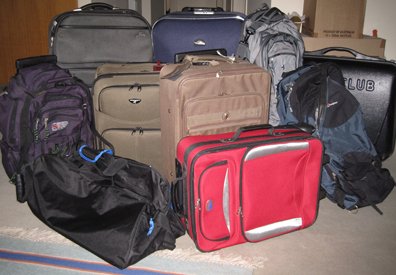With four months to go until our extended travel, we began ‘Operation Pack-Up Shut-Down’ this week. This is an earlier start than usual, but we have our wedding in a few weeks, which will involve some time away from home. I have moved over 15 times in my adult life, five of these being major international or transcontinental moves. Needless to say, I have a process. And in order for me not to drive myself and everyone around me crazy, I need to start early.
I’ve realized that there is an art to this type of mobility. We were not always so portable. Well, perhaps John was before we met, but I certainly had not evolved. It took several mistakes, a lot of wasted money and the realization that I’m the type of person who’ll always have itchy feet. I had to adjust or forever be a slave to my possessions. We have still not pared down as much as I would like. John is reluctant to toss things and I tend to save sentimental items that we rarely even look at.
Travellers often think about how to keep a light backpack. But if you aim to be an eternal expat, you have to keep your life light as well. I dream of being able to float from one furnished and equipped apartment to another. Of course, if we had that kind of money, we could probably buy a few places and jet between them. If you’re a long-term traveller, or someone who thinks you are headed in that direction, here are my 10 tips for maintaining a mobile lifestyle:
1. Be ruthless with your current inventory. Take a slow walk around your home, dig in some cupboards and check out the back of your closet. Now, be honest: how many things did you see that you never use, wear, read or look at? Unless you’re already disciplined, I’m guessing the number is large. Start paring back. Call your favourite charity and set a date for them to pick-up your unwanted items. In the meantime, ask yourself if you’re reasonably going to use or miss each item in question. If the answer is no and you don’t think it is something someone would buy, give it away. Put aside the things that might be valuable to someone else to sell later. If you have an item that is meaningful to you and it’s not small, light and easy to move, consider giving it to a relative for safekeeping until you finally settled down.
2. If you don’t need it, don’t buy it. Just stop acquiring stuff already. Some of us are very good about this and others are so impulsive that they’re drowning in debt. Try this: calculate each potential new purchase’s maintenance costs and add it to the sale price. Think about how big the item is, whether you’d be able or willing to sell it and the cost of storing and moving it if not. Can you borrow the item from a friend if it isn’t something you would use all the time? Will its benefits outweigh its costs? If not, put it back on the shelf.
3. Buy high quality items (but not so nice that you can’t bear to part with them). This may seem contrary to both the last tip as well as saving money, but think about the logic: quality items maintain their value, while junk does not. Obviously you don’t want to spend beyond your means, but we make a habit of buying the best things we can afford. You will see the usefulness of this practice when you go to sell your items. I have sold used goods at different times in several different cities and the things that sell fastest and at the best prices are the well-made, brand name products. The exception here is furniture, which we don’t spend a lot of money on. We buy decent items in classic styles, but because furniture is easily damaged while moving, we don’t spend too much money on it (except on our bed: quality sleep is a must!)
4. Take care of your things. This goes hand in hand with my last point. If you take good care of the items you have, you will be able to offload them when you’re ready to move. Think of household items like appliances, furniture, electrical equipment…even linens and clothing as items that you are only renting. Buy the best quality you can, keep it in good nick, and get a decent portion of your money back when you sell it.
5. Develop a sales strategy. I’ve been talking a lot about selling. You’ll need to discover the free online classified websites that are the most popular in your local area right away. In Australia, we use Gumtree, but Craigslist is immensely popular in most parts of the world. If you’re moving internationally, you’re not going to want to move a lot of stuff. Everything is a commodity these days and it’s cheaper to buy things new than to ship international freight. Even cross-country moves are prohibitively expensive. Storage space is also dear, so really think about whether you need what you’re putting in those boxes. Plan to sell your furniture, appliances and all the unwanted stuff from tip number one as soon as you don’t need them anymore. You’ll save on insurance and avoid depreciating the items you do have. You should also buy used goods where possible, especially if you aren’t staying in a place for more than a couple of years.
6. Get organized. Foresight is a beautiful thing. Sometimes you don’t have the luxury of advance planning, but if you’re lucky you can gain a lot from being methodical. If you’re organized, for example, you probably won’t move that expensive, heavy television set to a country with an incompatible voltage. You won’t duplicate purchases because something you forgot you had was stored under the bed. Organization can be everything from knowing what accounts you have open when it’s time to change addresses to pre-arranging your travel to keeping a tidy home (easy when you clear the clutter). Universally, it is a trait that will save you time and money, even when you aren’t moving around.
7. Join online social networks. There are more than 500 million people on Facebook, and if you’re reading this blog you’re probably one of them. But try to expand your membership to a few relevant online communities as well. There are plenty of expat pages and groups on both Facebook and LinkedIn, but travellers and expats can join Yahoo! groups, forums and Nings that are specific to their locations and interests. Not only will you meet new people and gain invaluable information, but there are sometimes perks for active members such as buy/sell/swap forums and housing advertisements.
8. Search for unique storage options. Mini-storage is one place to start, but if you’re looking to stash your stuff, think creatively about alternatives. Does your Great Aunt Sophie have an attic that you cleaned out a couple of years ago and is still sitting half-empty? Would she mind taking in at least some of your things? Is there a space rental website for your local area or have you checked the storage sections of your free local classifieds? You can almost always work out a cheaper agreement with a friend, family member or private individual than what you will get at a storage facility.
9. Learn how to pack like a pro. I take for granted how good I am at packing for a move. And no, I’ve never worked for a moving company. Practice makes perfect and I’ve learned the tricks that keep your items from showing up in a new location wet, dented or smashed. You must be efficient and careful when packing. Heavy items go at the bottom of small boxes. Fragile items should always be packed together with plenty of padding and as few items in the box as possible. Label and number your cartons and keep an inventory of everything inside each one. Be particularly careful if you’re moving overseas. Shoddy packing that is acceptable for a local move will not fly when items are being shipped overseas because international moves put much more stress on your boxes. They will be moved from your home to a temporary storage facility, to a packaging facility, to a container on a ship, to another temporary storage facility, and then finally to your new home. Things will be stacked haphazardly on top of each other and pushed and compressed into tight spaces, and your packing has to stand up to all of this.
10. Be flexible with living arrangements. You don’t always have to sign a year lease when you relocate. Where you reside will depend on your personal situation, your finances and the reason for your move. But sometimes it can pay off to be adaptable. Look for short-term leases so you can check out different neighbourhoods if you’re going to be living in a place for awhile. If you’re going somewhere short-term (one year or less), consider an apartment swap or moving in with an established resident. If you’re paying for your own accommodation, is it really worth it to spring for a corporate apartment? You can usually furnish an entire place for the mark-up and just sell it all later. Have a think before you commit to a firm housing situation in your new city.
Do you move around a lot? Share your mobility tips by commenting below:


